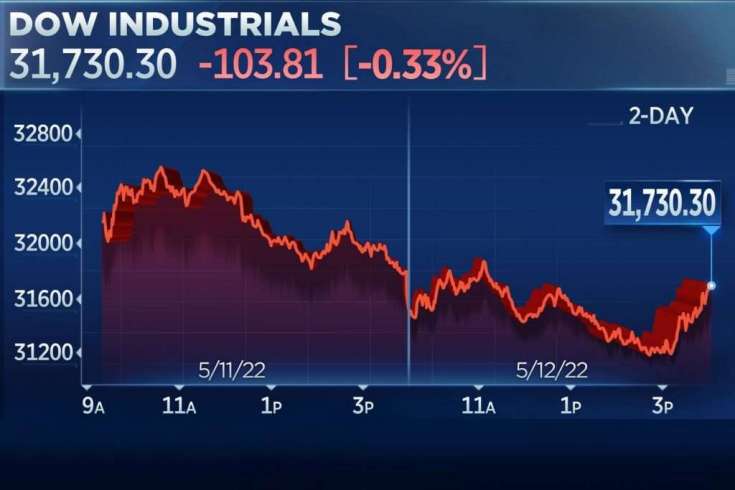
The Dow Jones Industrial Average fell for a sixth straight day Thursday, as traders failed once again to find their footing in an increasingly volatile market.
The 30-stock Dow slid 103.81 points to 31,370.30, or 0.33%. The S&P 500 fell 0.13% to 3,930.08. The tech-heavy Nasdaq Composite eked out a small gain, closing up 0.06% at 11,370.96. The three major averages were on track for weekly losses.
Earlier in the day, the market attempted to rebound as traders bought into beaten-down names. At one point, the Dow was up as much as 80 points at session highs, while the Nasdaq added 1.61%. At session lows, the Dow fell more than 500 points, while the Nasdaq dipped 2.25%.
The S&P 500 hit a new low for 2022, closing more than 18% off its 52-week high and steering closer toward bear market territory.
“Even if you say we’re in a bear market, there’s rallies within bear markets that can be very sharp,” said Truist’s Keith Lerner about the early market moves. “I think, at least short-term, and given how oversold we are and given that we’re starting to see people nibble at some of these areas that have been the most beaten up, I think that’s at least a silver lining in a sea of red and gloom over the last couple of days.”
Of the major averages, the Nasdaq is the only one in bear market territory, having fallen about 30% from its record high — as tech shares continue to get pummeled.
“It’s my opinion that this is a market that’s trading on emotions and not rational logic,” Jim Lebenthal of Cerity Partners told CNBC’s “Halftime Report” on Thursday. “Every day for the last however many days, you get this pop in the morning, and then it dribbles off.”
Loading chart…
Some heavily shorted names led the market’s brief rally attempt from earlier in the day and closed higher. Shares of Lucid popped 13.2% while GameStop and AMC jumped more than 10% and 8%. Rivian Automotive also soared nearly 18% after reporting its latest quarterly results. Carvana, which hit a two-year low earlier in the session, ended the day up nearly 25%.
While it was unclear what was driving gains from Lucid, GameStop and AMC, it could mean a short squeeze was taking place, where hedge funds that have profited from the steep losses in overvalued pandemic winners this year were finally closing out their short positions by buying back the shares.
Short selling is a tactic where funds sell shares that are borrowed from investment banks and so in order to close the trade they need to buy the stocks and return them. A short squeeze is a rally that results from that buying.
This trading action could indicate some investors who have made hefty bets on the beaten-up meme stocks are upping the ante in the hopes of winning big, said Randy Frederick, managing director of trading and derivatives at the Schwab Center for Financial Research.
“I think it’s a desperate move, it’s a gambling move, it’s a lottery ticket hoping for a big payout and they may get lucky, but most likely, probably not,” he said.
Apple lost 2.7%, pushing the shares into bear market territory and down 22% from a 52-week-high. The company’s recent downdraft has led Saudi Aramco to become the world’s most valuable in the world. Meanwhile, shares of Amazon and Meta Platforms closed up more than 1%.
Disney shares fell to a two-year low but closed down about 0.9%. The media giant reported higher-than-expected streaming subscriber growth, but warned about the Covid impact on parks in Asia.
These moves came as traders pored over the latest U.S. inflation data. Fresh producer price index data, which measures prices at the wholesale level, rose 11% year over year.
On Wednesday, the U.S. government posted the latest consumer price index reading, which showed an 8.3% year-over-year jump in April. That’s higher than what economists expected and close to a 40-year-high of 8.5%.


